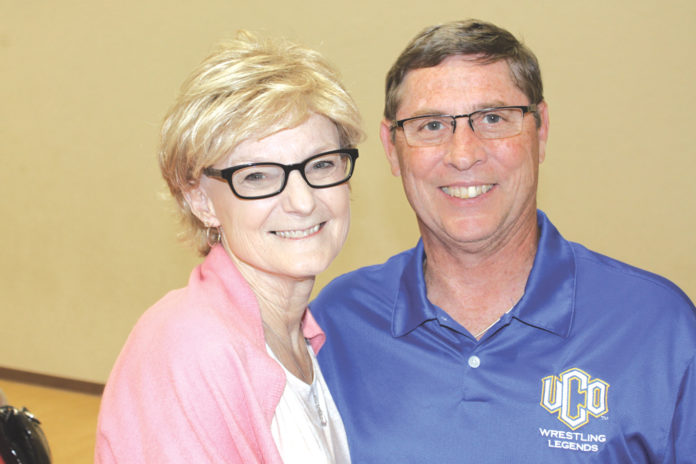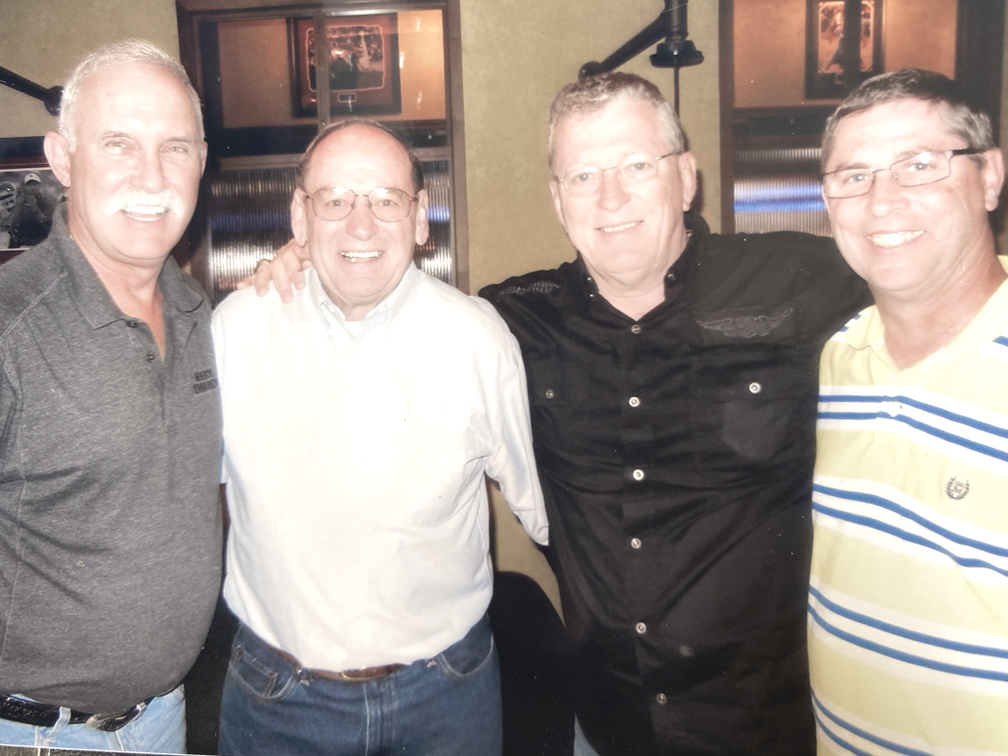
Story by Darl Devault, Feature Writer

Randy Ross, 66, says as the mayor of Choctaw and the executive director of the Oklahoma Accountancy Board his life’s outlook was shaped 50 years ago by an important coach.
“I started wrestling when I was 9 years old in the fourth grade,” Ross said. “Compared to a lot of kids I won far more than I lost, but I never achieved my goal of a state championship in high school at Midwest City, ending up as a State Runner-up. But I won more when I got to college. including becoming the first All-American in modern times at Central State University (now the University of Central Oklahoma).”
What he also gained from those hours spent in the wrestling room is something not measured by wins or medals, but instead by learning important life lessons lasting forever, he said.
He has been called chairman, president, mayor and many other titles in different organizations. Those titles come and go, but one thing never changes—he can say “I am a wrestler.”
“I learned the discipline necessary to study for and pass the CPA exam from wrestling,” Ross said. “I learned to persevere through difficult times, through tragedies, through the highs and lows of life, to take the next step.”
His high school wrestling coach, Jim Kinyon, made a significant impact on Ross’ life on his way to coaching Midwest City High School wrestlers to the school’s first wrestling state championship 50 years ago in 1971 and again in 1972.
Coach Kinyon taught them the skills and techniques required to be successful on the mat. “Important to my future and who I am today he also understood as a coach of impressionable young men he had an opportunity to instill character traits to last a lifetime,” Ross said.
“My successes in life and my career are founded on the lessons the great sport of wrestling gave me,” Ross said. “In my career, I have fought the battles in board rooms, managed the tough political campaigns. I have weathered the insults from fans as I officiated matches. A coach or two might have had choice comments, but wrestling gave me the tools to handle mentally and physically whatever was tossed at me.”
Kinyon died in 2016, but his legacy has lived on among the hundreds of lives he positively affected through the sport of wrestling. Ross says these are the life lessons he modelled for his athletes.
Be Humble and Keep Working
There is no bigger test than competing in one-on-one physical combat. But unless you are a world-beater, there will always be someone better than you. Kinyon helped Ross make the choice to go on to compete in college.
Success in wrestling is directly proportional to the amount of training you undergo. Being physically talented is one thing, but often the outcome of a match is decided by which athlete has put more work into practice and conditioning. There is no substitute for hard work, an important lesson which helps post-wrestling. Without Kinyon’s early guidance Ross says he would not have likely been elected to the Oklahoma Chapter of the National Wrestling Hall of Fame in 2017.
Accountability
Wrestling is an individual sport, so accountability is everything. Wrestling is also a team sport as points are awarded at each weight class based on who won each match and by how much. After a wrestling meet the total team points decides the team victory or loss.
After weigh-in before a tourney Kinyon would go over this information with each Bomber wrestler. He explained what to expect from their opponent. Once he got to the end of the weights, he would add up the points each wrestler would likely earn. He then told the team what we needed to do to win the tournament.
This ability to use figures to give others confidence in what they are doing may well be the reason he became an accountant at UCO.
Mental toughness is as important as physical strength.
Ross was injured in a car accident in high school. Coach Kinyon worked with him create the mental toughness needed to continue to perform.
“An example of this is two days before the 1972 state tournament I came down with an intestinal bacterial infection,” Ross said. “I did not practice the next day, laid up in bed. That night Kinyon came to my house and took me to the high school to weigh. I was a couple of pounds over my 106-pound weight class. Kinyon told me what to eat and they would be by to pick me up for weigh-in the next day.”
Ross offered to let Gus Blackwell wrestle in his place, but Kinyon said “No, you helped us get this far, and if you can walk, you are going to wrestle.”
Ross took second place in the tourney, helping the team to a second consecutive state championship.
“Coach Kinyon taught me even more important than physical strength is your attitude,” Ross said. “If you allow it to, your mind will almost always give up before your body. Wrestling not only works the body but the mental aspect and controlling emotions before and during a match is a key to success and later life.”
Confidence Through Preparation
Kinyon was known for his calm demeanor during matches, often appearing as an observer, like the fans. This special mix of strong teaching skills and high-performance standards won him honors as a coach. Only coaching at Midwest City for four years, 1969-1972, Kinyon was named 1971 and 1972 Oklahoma Class 4-A wrestling coach of the year.
“I never won a state championship, the kids won the state championships,” Kinyon said in 1995. “Wrestling is a game of skills. The guy with the best skills is usually the guy who wins. If it were just strength, then all your big football players would be great wrestlers. But it is a game of skills. Once you master those skills it just comes natural to you.”
Asked to compare his mat side coaching style to his rivals Kinyon said he felt the other coaches tried a little too hard to coach during the match because they felt helpless themselves about the outcome.
“It is out of your control (once the match begins)—if you haven’t done a good job of teaching… then your athletes are in trouble,” Kinyon said in 1995. “Where you win you dual is on Monday, Tuesday and Wednesday… on Thursday you lighten up a little bit, then you make weight, and you are ready for the match. The coaching is done. If you have to coach a guy—you can give him some pointers, but the real coaching is done in the practice room.”
“Once I graduated from college, I found this same mentality can be taken into any group or work setting,” Ross said. “Learning to properly prepare for any situation is extremely valuable.”
Discipline
Wrestling is a lifestyle. It requires dedication and discipline away from the mat, especially when it comes to diet and nutrition.
Nothing will tax your body more than a wrestling match and any deficiencies in your diet will affect your performance. Wrestling also requires the discipline to put in the extra 6 a.m. run or after-practice weight session if you want to be successful.
“My interaction with coach Kinyon rewarded me with exposure to all these qualities,” Ross said. “They helped spark my college studies and wrestling career to remain with me throughout my life. This preparation in life has allowed me to handle the many ways I have been stretched serving the citizens as a public figure while being the mayor of Choctaw.”













